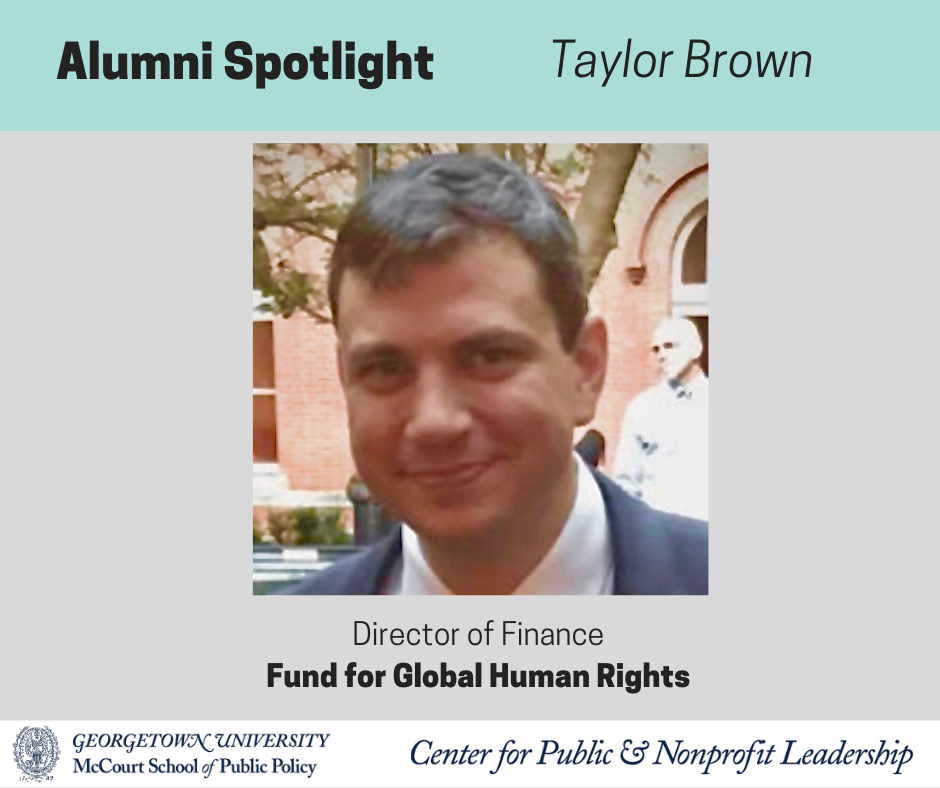Alumni Spotlight: Taylor Brown, Fund for Global Human Rights

Taylor Brown is the Director of Finance at the Fund for Global Human Rights and is an Adjunct Faculty Member teaching in the Sports Industry Management Program at Georgetown University’s School of Continuing Studies. The Center for Public and Nonprofit Leadership spoke with Taylor about his work in the nonprofit sector and his experience in the Certificate Program.
CPNL: The nonprofit sector is vast with many important causes to champion, what led you to pursue a career in your particular field?
Brown: I started out in the nonprofit sector, first as an auditor with RSM, an international accounting firm. After I attended business school, I accepted a two-year fellowship based in Durban, South Africa with PeacePlayers International, a sport-based youth development NGO working to unite divided communities through the game of basketball. Working in the township and rural communities in and around Durban expanded my worldview and inspired me to devote my professional career to the peacebuilding and human rights space, combining my business skill set with the international NGO/Foundation community.
In addition to working in the nonprofit space, I’ve also been teaching in Georgetown’s Sports Industry Management Master’s program since 2013 at the School of Continuing Studies. I have worked primarily as the Subject Matter Expert for the Social Responsibility and Globalization in Sports course and have enjoyed teaching as an outlet to share my experiences in the international nonprofit community with students and continue to be a part of the Georgetown Community.
CPNL: The Fund for Global Human Rights supports local groups defending dignity, justice, and equality in over twenty-five countries. In response to the COVID-19 pandemic, some funders have shifted their priorities. What are some of the projects the Fund for Global Human Rights is currently funding?
Brown: The Fund’s model was designed to get flexible funding and strategic assistance to activists on the front lines of human rights struggles all around the world. So, when the pandemic began, we were able to adjust quickly. We made nearly 150 COVID-related grants in 2020, helping activists adapt, reallocate resources, and meet their communities’ most urgent needs due to the pandemic. Their actions included getting food to Indigenous communities in Honduras, translating COVID information for Karen people in displacement camps in Myanmar, and pushing back when authoritarian governments tried to use the pandemic as an excuse to limit civil liberties in Nigeria.
As creative and resourceful as the activists we support are, they’re also facing constant challenges as they tackle health, economic, and justice crises in their communities. In July, we were one of six human rights organizations that launched the COVID-19 Grassroots Justice Fund. Our aim is to raise $1 million to support 100 grassroots groups working to make sure that human rights are a part of response and recovery efforts all around the world
CPNL: The Fund for Global Human Rights works directly with community members. Why is it important to fund the work of grassroots activists? What are the opportunities and challenges related to this funding strategy?
Brown: The Fund’s model is uniquely shaped around the challenges faced by our trusted grassroots partners. We believe the people who live with systemic inequalities – poverty, barriers to health care, discrimination – are best positioned to address them. But it’s difficult for many of them to connect with funding or allies that will help drive their work. That’s why the Fund focuses on equipping grassroots activists with financial support, as well as opportunities to collaborate and form networks with people in their own communities and beyond. We know real change takes time and we invest in groups’ long-term work and sustainability. Because the activists we support are often holding powerful forces accountable – from authoritarian governments to organized crime – they face tremendous risks. So, we provide emergency support as needed. Our ultimate goal is to create stronger, resilient human rights movements that shift power back to marginalized communities and transform lives for generations to come.
CPNL: What is one significant challenge you have faced as a leader in the nonprofit sector?
Brown: A key challenge in working with international nonprofits is the differing expectations when it comes to organizational culture and living organizational values. Staff of differing backgrounds bring a diversity of knowledge and experiences to organizations, and if that diversity is well managed, the organization can fulfill its mission and achieve strong results through collaboration. If it’s not well managed, it can bring about significant challenges. A key focus is that international nonprofits really need to invest heavily in building a strong and diverse workplace to ensure that everyone, especially leadership, are truly living the organization’s values every day.
CPNL: How has the Certificate Program helped you in your career?
Brown: The Certificate Program really gave me strong insights into the various functional areas that exist across nonprofit organizations, not only finance and operations, which is my focus, but also the areas in which I haven’t worked directly, such as communications, marketing, etc. Completing the Certificate Program helped me transition from being a functional or departmental leader, to having the mindset and skill set of an organizational leader.
CPNL: What advice would you give to other professionals considering participating in the Certificate Program?
Brown: Sign up and apply! You will collaborate with a thoughtful and diverse group of colleagues in your cohort and learn from an incredible set of academics and practitioners. Once you finish, you will be part of a 1,500+ group of dedicated alumni with similar values who are committed to fostering positive social change.
